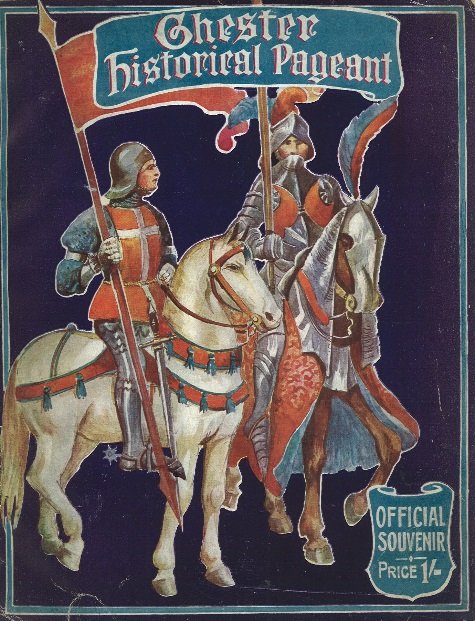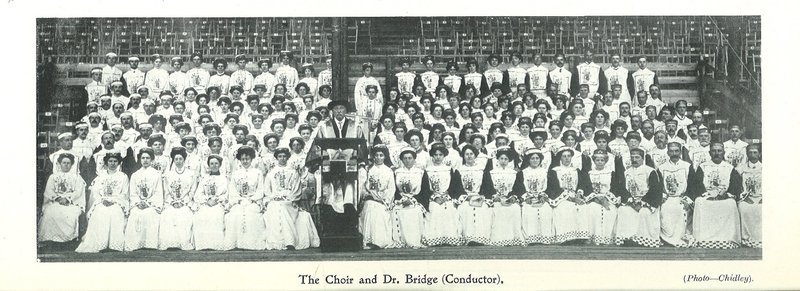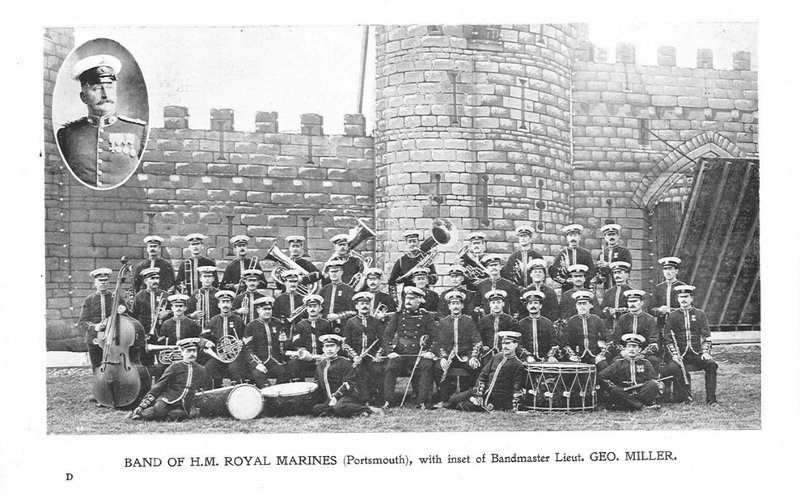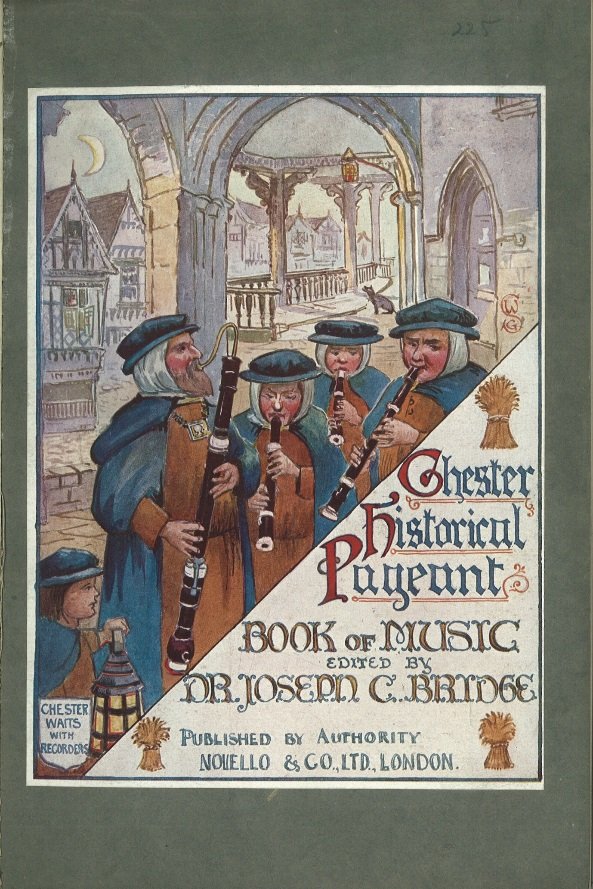The Music of the 1910 Chester Historical Pageant
This is a guest post by Emma Greenwood, special collections librarian at the Jerwood Library, Trinity Laban Conservatoire of Music and Dance. The library holds a number of pageant books from the early twentieth century including the book of words, book of music and the souvenir guide to the Chester Historical Pageant. Visitors are welcome: please see their website for more details.

Official Souvenir of the Chester Historical Pageant (Manchester, 1910).
Described by The Times as ‘one of the most spirited that pageantry has produced,’ the Chester Historical Pageant of 1910 took place in Eaton Park, the estate of the Duke of Grosvenor, between 18 and 24 July. A reported 3,000 performers were involved and over 70,000 spectators attended - a considerable achievement for a city of only 50,000. In eight episodes the pageant depicted local events beginning with Agricola returning to Deva (the Roman fortress which later became Chester) after defeating the Ordovices in AD 78, and ending in 1645 with the Siege of Chester, one of the last confrontations of the English Civil War (see below for full list of episodes with related music).
The ‘master
of the music’ whose task it was to compose, edit, and
organise performance of the music for the pageant was Dr Joseph Cox Bridge
(1853-1929). Although originally from Rochester, Bridge was a well-known figure
in Chester's musical life - he had been organist at its cathedral since 1877,
had revived the Chester Musical Festival, and had founded the Chester Musical
Society. He was also known, along with his brother Frederick (organist of
Westminster abbey), for his antiquarian interests, and had contributed articles
to local historical journals. Both brothers were involved in the senior
management of Trinity College of Music (now Trinity Laban) at various times,
and donated many items to the college library, including Joseph's collection of
pageant books.

Official Souvenir of the Chester Historical Pageant (Manchester, 1910).
Most of the pageant music was either written or arranged for large chorus. A choir of around 350 singers was mustered for the occasion and performed unaccompanied in between episodes rather than as an integral part of the dramatic action. As at other pageants, a military band was also employed for a small number of items, as was a piano. In terms of repertoire, Bridge’s choices were varied, encompassing contemporary English choral music, original compositions, folk song, and early English instrumental music. Several items were chosen specifically for their local resonance: a seventeenth-century madrigal from former Chester Cathedral organist Thomas Bateson, dance tunes from court musician William Lawes who died defending King Charles I at the Siege of Chester, music reputedly played by the renaissance Chester City Waits, and some local folk songs.

Official Souvenir of the Chester Historical Pageant (Manchester, 1910).
Bridge’s own compositional contributions were limited to four items. The most prominent of these was his choral finale Ode to Chester which was a jolly, if rather simplistic, march in a style reminiscent of a Gilbert and Sullivan operetta. It was noticeable however that Bridge had not composed all of the pageant music as others had done and would do elsewhere - T. Tertius Noble at York in 1909 or James Lively Gregory at Hertford in 1914 for instance. Nevertheless Bridge did include music by contemporary or near-contemporary choral composers Lewis Hann, Henry Smart and Arthur Sullivan in a display of home-grown compositional talent which was to become an important feature of pageants. (The epic Pageant of Empire in 1924, with music especially commissioned from Edward Elgar, Granville Bantock and numerous other English composers, could be seen as a particularly proud rebuke to the recent challenge that England was ‘Das Land Ohne Musik’.)
The rest of the pageant music aimed at highlighting the strength of past English musical cultures. This was very much in line with contemporary musicological concerns. The inclusion of Thomas Bateson’s madrigal Sisters Awake, for example, should be seen within the context of a resurgence of interest in early English part songs instigated by musicians such as Charles Kennedy Scott. Early English instrumental music was also being re-discovered at this time although performances were hindered by a lack of modern replicas of obsolete instruments, and possibly a lack of interest in historical performance practices. Thus a selection of seventeenth-century consort music for viols by Henry Lawes was presented at the pageant on piano. Meanwhile, a rare set of early eighteenth-century recorders, thought to have been played by the Chester City Waits, was carried proudly but silently through the pageant procession (it was not until 1919 that Arnold Dolmetsch created the first modern replica of a recorder).

J.C. Bridge (ed), Chester Historical Pageant, July 18th to 23rd, 1910 ... Book of Music (London, 1910).
Bridge's inclusion of folk songs, from the local area and beyond, fitted into the rather more high-profile revival movement of English folk song (Cecil Sharp, now the most well-known name associated with folk song revival, began collecting songs in 1903). As with the early music revivalists, proponents sought a distinctly English musical idiom to inform and inspire a self-consciously nationalistic approach to music-making. For pageantry, folk songs could also be used to reinforce a connection with the past. Hence, the midsummer revels in episode seven, complete with maypole dances and songs such as Joan to the Maypole, were presented as a living tradition (even if their performance by four-part chorus was far removed from any notion of authenticity). The inclusion of The Miller of Dee was additionally significant since a medieval mill situated near Chester on the river Dee was at that time scheduled for destruction.
Although he was not himself a great composer, Bridge’s musical contribution to the Chester Historical Pageant was considerable. In particular, his choice of early and folk music elements gave a prominent platform to revival movements. On hearing the old English ballad Come Lasses and Lads for the first time one visitor reportedly declared emotionally, ‘I love this music’. This new-found interest in early and folk music would lead, among other consequences, to a burgeoning sense of nationalism in English composition - many works by Ralph Vaughan Williams were for instance inspired by folk and early English music. But Bridge's other choices were also informed by a patriotic musical sensibility. His inclusion of late Victorian/early Edwardian choral compositions were reminders of the vitality of the English church music scene. And the presence of a military band tapped into another, equally potent, tradition of English music-making, even if two out of three of their items were written by foreign composers. Ultimately, pageants such as that at Chester in 1910 had a significant impact on English musical culture in the early twentieth century. They helped to instil confidence in local music-making, created performance opportunities for local composers and fuelled an appetite for nationalist musical traditions.
List of music with related episodes
National Anthem
Invocation to Deva (Lewis Hann)
Episode 1: Agricola returns to Deva after defeating the Ordovices AD78.
Integer Vitae (F. Flemming)
Invocation to Sabrina (Henry Lawes)
Episode 2: King Eadgar on his imperial progress with Queen Aelfthryth receives the homage of tributary princes AD973.
Almain, Saraband, Jigg (William Lawes)
Waken, Lords and Ladies Gay (Henry Smart)
Episode 3: Hugh Lupus with St Anselm founds the abbey of St Werburgh AD1093
Founders’ Hymn (J. C. Bridge)
Chorus of Monks (J. C. Bridge)
O Gladsome Light (Arthur Sullivan)
Episode 4: Archbishop Baldwin preaches the crusade at Chester AD1189
Prelude (Sergei Rachmaninov)
Morris Dance (Edward German)
Prelude to Sigurd Jorsalfar (Edvard Grieg)
Episode 5: Prince Edward first royal Earl of Chester and princess Eleanor visit Chester AD1256
Miller of Dee (trad.)
Cheshire Cheese (trad.)
Episode 6: Richard II is brought a prisoner to Chester by Henry Bolingbroke AD1399
Waits tunes (trad.)
Come Lasses and Lads (trad.)
Joan to the Maypole (trad.)
Episode 7: a) King James I visit Chester AD1617 b) The Midsummer revels ca. AD1620
Hobby Horse Song (J. C. Bridge)
Sister Awake (Thomas Bateson)
Episode 8: Siege of Chester.
Visit of King Charles AD1645
Ode to Chester (J. C. Bridge)
*Out of copyright images kindly provided by Emma Greenwood*
